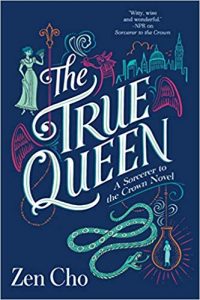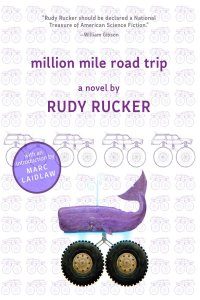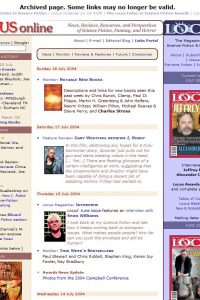Year in Review, 2019 by Graham Sleight

Over the past few years, I’ve been talking here about a couple of recurring ideas on the shape of the SF and fantasy world. For instance, the notion that these fields are increasingly a pluralism and that there’s no default way that one should expect an SF/F novel to be written; that interplay between “genre” and “mainstream” writers of the fantastic is increasing, fruitfully; and that “science fiction” and “fantasy” are less and less satisfactory as labels for such diverse fields. None of these notions, I realise, are especially revolutionary, but it can become difficult to see their cumulative effect unless one steps back from day-to-day reading – and reviewing the good books read over the last year is an opportunity to do just that. The books I read in 2019 reflect those themes, but also carry the usual health warning: my reading (or any one person’s reading) can’t cover the whole of the field, especially when the field is not singular: trust a whole bunch of tellers, not any one tale.
In recent years, Nina Allan has become one of the most valuable contributors to the field, both in fiction and non-fiction. The Silver Wind (Titan) was a moving tale of time-travel and choice, while The Dollmaker (Riverrun) was a less fantastic exploration of obsession. Throughout both, Allan is a careful and knowing user of the tropes she plays with. Charlie Jane Anders’ The City in the Middle of the Night (Tor) was a less sparky novel than its predecessor All the Birds in the Sky, but none the worse for that. It engaged with the long-standing question of engagement between humans and aliens, specifically evoking Ursula Le Guin’s careful, nuanced explorations of other cultures. Margaret Atwood’s The Testaments (Knopf) was, of course, a sequel to The Handmaid’s Tale, asking – topically – what sorts of things we can take hope from, and what kinds of action can follow. Michael Blumlein’s novella Longer (Tor.com) was a fine and moving last debate about mortality from an underappreciated writer. Ted Chiang’s Exhalation (Knopf) is self-recommending: it assembles more than a decade’s worth of short fiction from the most humane and radical speculator in the field. Chiang has preserved his miraculous clarity in explaining even the most complex of ideas.
 Zen Cho’s The True Queen (Penguin) follows on from Sorcerer to the Crown in some style, having great fun with systems of magic and Regency London. Ta-Nehesi Coates’s The Water Dancer (One World) tackled, like Colson Whitehead’s The Underground Railroad, the world of pre-Civil-War US slavery through a fantastic lens. John Crowley’s And Go Like This (Small Beer) gathered extremely various tales from the last decade or more – stories that often, like “The Girlhood of Shakespeare’s Heroines” or “Anosognosia”, seemed to grasp the whole shape of a life. Aliette de Bodard’s The House of Sundering Flames (Orion) continued her vivid exploration of a changed, magical Paris. Greg Egan’s Perihelion Summer (Tor.com Publishing) tackled a global transformation with typical rigour, while The Best of Greg Egan (Subterranean) was a comprehensive introduction to one of the most distinctive and scientifically engaged bodies of work of the last few decades. This is How You Lose the Time War by Amal El-Mohtar & Max Gladstone (Saga) deserves the acclaim it has received: it’s a sharp, concise, epistolary novella about the commonalities created by conflict. Sarah Gailey’s Magic for Liars (Tor) was an invigorating noir debut with a fantastic twist. Lisa Goldstein’s Ivory Apples (Tachyon) was a delightful and thoughtful contemporary fantasy about family and history from one of the field’s most underappreciated authors. Kameron Hurley’s The Light Brigade (Saga) was a bracing argument with some of the verities of military SF, not least with Heinlein’s Starship Troopers.
Zen Cho’s The True Queen (Penguin) follows on from Sorcerer to the Crown in some style, having great fun with systems of magic and Regency London. Ta-Nehesi Coates’s The Water Dancer (One World) tackled, like Colson Whitehead’s The Underground Railroad, the world of pre-Civil-War US slavery through a fantastic lens. John Crowley’s And Go Like This (Small Beer) gathered extremely various tales from the last decade or more – stories that often, like “The Girlhood of Shakespeare’s Heroines” or “Anosognosia”, seemed to grasp the whole shape of a life. Aliette de Bodard’s The House of Sundering Flames (Orion) continued her vivid exploration of a changed, magical Paris. Greg Egan’s Perihelion Summer (Tor.com Publishing) tackled a global transformation with typical rigour, while The Best of Greg Egan (Subterranean) was a comprehensive introduction to one of the most distinctive and scientifically engaged bodies of work of the last few decades. This is How You Lose the Time War by Amal El-Mohtar & Max Gladstone (Saga) deserves the acclaim it has received: it’s a sharp, concise, epistolary novella about the commonalities created by conflict. Sarah Gailey’s Magic for Liars (Tor) was an invigorating noir debut with a fantastic twist. Lisa Goldstein’s Ivory Apples (Tachyon) was a delightful and thoughtful contemporary fantasy about family and history from one of the field’s most underappreciated authors. Kameron Hurley’s The Light Brigade (Saga) was a bracing argument with some of the verities of military SF, not least with Heinlein’s Starship Troopers.
 Tim Maugham’s Infinite Detail (FSG) was pretty clearly the best debut of the year, and perhaps the best SF novel, full stop. It was a detailed and carefully thought-through near-future tale of the internet (and its absence), privacy, surveillance, and connection. Ian McDonald’s Luna: Moon Rising (Tor) continued his fascinating story of organised crime families on the Moon. Sam J. Miller’s Destroy all Monsters (HarperCollins) is the sort of YA novel that should be read by a wider audience, juggling as it does the idea of fantasy as an escape from trauma. It’s striking how much Miller, like Nina Allan, has become a significant figure in the field within only a few years. Tamsyn Muir’s Gideon the Ninth (Tor) was billed as featuring lesbian necromancers exploring a gothic castle in space; it lived up to that pitch, and then some. Helen Oyeyemi’s Gingerbread (Penguin) brought together the contemporary and the fairy tale in an entirely delightful way. Gareth L. Powell’s Fleet of Knives (Gollancz) continued the large-scale space-opera saga begun in Embers of War, with some style. Christopher Priest’s Episodes (Gollancz) collected a range of short fiction, some of which even the most devoted Priest-follower might otherwise have missed. Priest’s characteristic misdirections work most effectively at novel-length, but there are still some surprises and innovations here. Rudy Rucker’s Million Mile Road Trip (Night Shade) was…very Rudy Rucker: strangeness, California, music, strangeness. Karl Schroeder’s Stealing Worlds (Tor) was, despite the title, not a space opera but a gritty near-future story of our entanglement with the technologies we thought were our servants. Michael Swanwick’s The Iron Dragon’s Mother (Tor) returned to the grimy and detailed urban fantasy world he’s explored in previous novels; it still proves a fruitful territory for new ideas. Gary K Wolfe’s selection of American Science Fiction: Eight Classic Novels of the 1960s (Library of America) was, as he discusses in his Introduction, a more contestable selection than the ones he made for the parallel 1950s set. But each of his choices is worth reading, and as a set they demonstrate the range of approaches to SF that was developing then.
Tim Maugham’s Infinite Detail (FSG) was pretty clearly the best debut of the year, and perhaps the best SF novel, full stop. It was a detailed and carefully thought-through near-future tale of the internet (and its absence), privacy, surveillance, and connection. Ian McDonald’s Luna: Moon Rising (Tor) continued his fascinating story of organised crime families on the Moon. Sam J. Miller’s Destroy all Monsters (HarperCollins) is the sort of YA novel that should be read by a wider audience, juggling as it does the idea of fantasy as an escape from trauma. It’s striking how much Miller, like Nina Allan, has become a significant figure in the field within only a few years. Tamsyn Muir’s Gideon the Ninth (Tor) was billed as featuring lesbian necromancers exploring a gothic castle in space; it lived up to that pitch, and then some. Helen Oyeyemi’s Gingerbread (Penguin) brought together the contemporary and the fairy tale in an entirely delightful way. Gareth L. Powell’s Fleet of Knives (Gollancz) continued the large-scale space-opera saga begun in Embers of War, with some style. Christopher Priest’s Episodes (Gollancz) collected a range of short fiction, some of which even the most devoted Priest-follower might otherwise have missed. Priest’s characteristic misdirections work most effectively at novel-length, but there are still some surprises and innovations here. Rudy Rucker’s Million Mile Road Trip (Night Shade) was…very Rudy Rucker: strangeness, California, music, strangeness. Karl Schroeder’s Stealing Worlds (Tor) was, despite the title, not a space opera but a gritty near-future story of our entanglement with the technologies we thought were our servants. Michael Swanwick’s The Iron Dragon’s Mother (Tor) returned to the grimy and detailed urban fantasy world he’s explored in previous novels; it still proves a fruitful territory for new ideas. Gary K Wolfe’s selection of American Science Fiction: Eight Classic Novels of the 1960s (Library of America) was, as he discusses in his Introduction, a more contestable selection than the ones he made for the parallel 1950s set. But each of his choices is worth reading, and as a set they demonstrate the range of approaches to SF that was developing then.
Among non-fiction books, I especially enjoyed Gwyneth Jones’s book on Joanna Russ and Robert Markley’s on Kim Stanley Robinson (both in the University of Illinois’s Modern Masters of Science Fiction series); Farah Mendlesohn’s The Pleasant Profession of Robert A Heinlein (Unbound), Amy Binns’s Hidden Wyndham: Life, Love, Letters (Grace Judson), and Adam Roberts’s HG Wells: A Literary Life (Palgrave). Emily Nussbaum’s I Like To Watch (Random House) was a collection of her TV criticism from The New Yorker and elsewhere – not just about genre TV, but whatever the subject, bringing to bear close observation and an awareness of the wider world.
A final note: as I was finishing off this summary, I heard of the death of the great Scottish writer Alasdair Gray. His “Englishings” of Dante’s Hell and Purgatory (Canongate) are quirky and idiosyncratic – typical Alasdair Gray, in fact. It’d be wonderful if we also had the chance to see Paradise.
Ten books of the year:
The City in the Middle of the Night, Charlie Jane Anders (Tor)
The Testaments, Margaret Atwood (Knopf)
Exhalation, Ted Chiang (Knopf)
And Go Like This, John Crowley (Small Beer)
This is How You Lose the Time War, Amal El-Mohtar & Max Gladstone (Saga)
The Light Brigade, Kameron Hurley (Saga)
The Best of R.A. Lafferty (Gollancz)
Infinite Detail, Tim Maughan (FSG)
Gideon the Ninth, Tamsyn Muir (Tor)
The Iron Dragon’s Mother, Michael Swanwick (Tor)
This and more like it in the February 2020 issue of Locus.
 While you are here, please take a moment to support Locus with a one-time or recurring donation. We rely on reader donations to keep the magazine and site going, and would like to keep the site paywall free, but WE NEED YOUR FINANCIAL SUPPORT to continue quality coverage of the science fiction and fantasy field.
While you are here, please take a moment to support Locus with a one-time or recurring donation. We rely on reader donations to keep the magazine and site going, and would like to keep the site paywall free, but WE NEED YOUR FINANCIAL SUPPORT to continue quality coverage of the science fiction and fantasy field.






